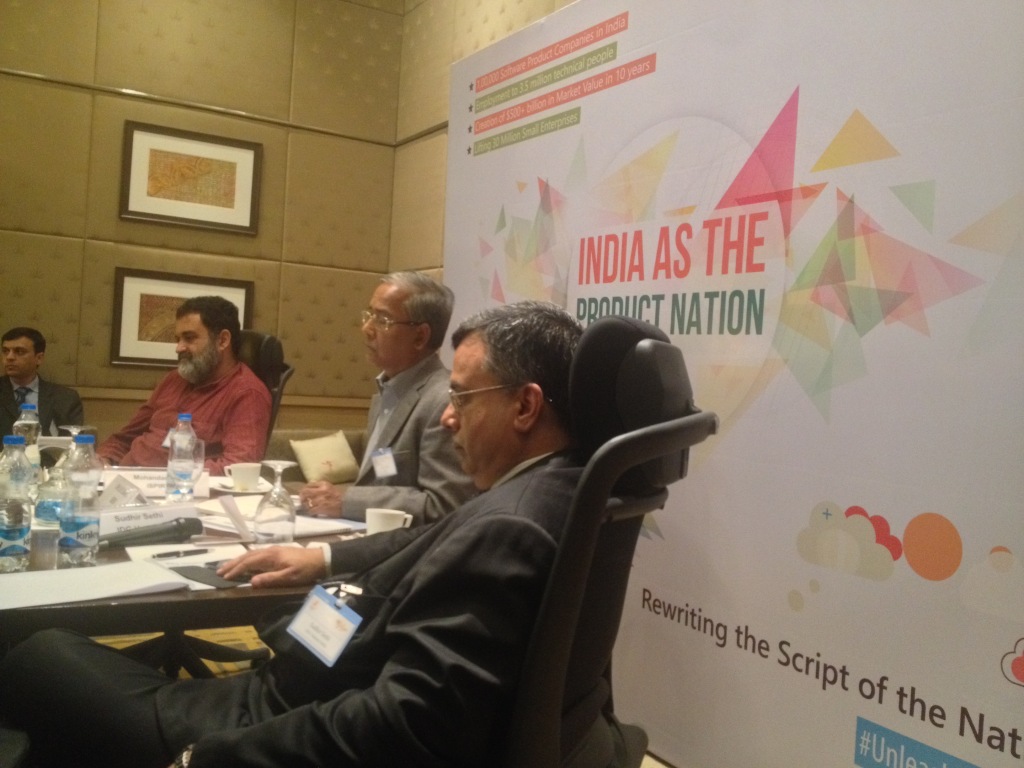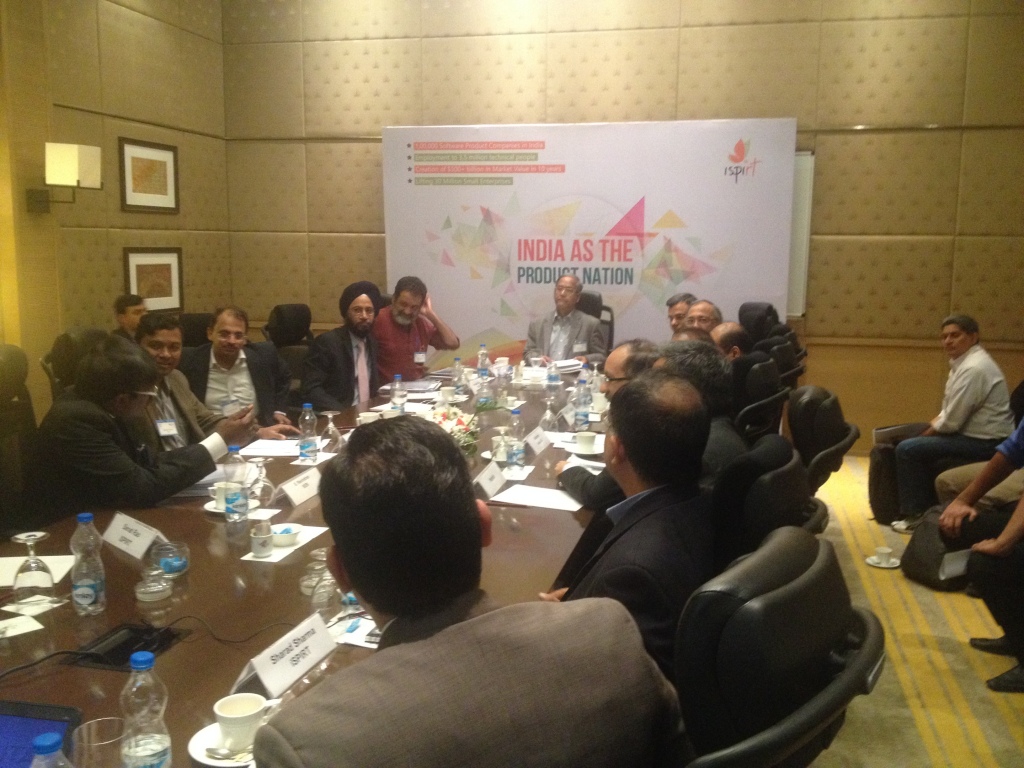How often has this happened? An entire team from Securities and Exchange Board of India (SEBI) with its Chairman Mr. U.K. Sinha meeting with Software Product startups in Bangalore to understand their challenges and also provide useful advice by participating in interactive sessions for more than 5 hours.
On 19th December, Mr. U.K. Sinha, Chairman of SEBI and his management team, heard the stories of 8 Indian software product startups. The idea was to understand both the Capital Markets Challenges (like raising capital from FIIs, listing for IPOs, and other book building challenges) as well new developing landscape of Consumer Market Challenges (like changing landscape of payments, pre-payments, recurring payments, etc.)
Mr. U.K. Sinha, was very forthcoming with his admission that new age companies require a completely new paradigm of evaluation and approvals. The new paradigm is needed not just for listing purposes, but also for market regulation and growth purposes. He assured full commitment from SEBI’s end to the budding entrepreneurs that SEBI is very keen, and will do everything within its capacity to help develop the markets keeping in mind INDIA’s growth needs.
More than 90 minutes of conversation and showcasing of New Software Product Startups from Bangalore took place. Mohandas Pai chaired the sessions on iSPIRT’s side. Not all elements of the sessions can be reproduced here; below are some of the key highlights.
Home grown Startups share their Stories with SEBI
About 8 Indian Startups which started in INDIA, and which have global operations today, presented their stories not just from a valuation and growth standpoint, but from an emotional and proud-to-be an Indian startup viewpoint. To sum it up, almost every story was about Entrepreneurs who dared to dream something not only for them, but for INDIA, and today want the Indian System (Regulators, Government and Institutions) to reciprocate to their needs. They highlighted their list of issues which include the following:
- 8 companies from various sectors (InMobi’s Manish Dugar, Ezetap’s Byas, Exotel’s Shiv Ku, HotelLogix’s Aditya, iViz’s Bikash, Paytm’s Pratyush, QuickHeal’s Rajesh and Deck.in‘s Sumanth) all presenting the journey of their startups.
- A common hardship that resonated from most of them, was the unwarranted need of setting up subsidiaries or parent companies abroad, just to attract the right Investors and raise capital for growth.
- Exemplary companies like InMobi, which raised initial money from Angel Investors today has a reach of about 1 billion people. Ezetap which raised initial money from AngelPrime, today has global operations, however it has its manufacturing, done entirely from Electronic city in Bangalore. Both urged that it should be made easy for Indian companies to raise money from Global Investors.
- The existing regulations and guidelines make it very difficult for companies to get the right people (investors and advisors) on their Board.
- Exotel, Hotelogix, Paytm and iViz, all stressed the need for modifying the SEBI/RBI guidelines on ESCROW, where Indian shareholders should have similar opportunities like Global Investors.
- QuickHeal’s Rajesh highlighted how Kailash Katkar, a college drop-out had built one the most successful product companies out of INDIA over the past 25 years. Today QuickHeal is thinking of its IPO and needs to decide where to list.
- Requirement for the Regulator to understand all stake-holders and their motivations, and provide for fast and timely intervention for Exits (IPO listings, etc.).
- Need for new models to evaluate the new paradigm of Tech/Internet Product startups in INDIA.
At the end of this open session, Shekhar Kirani (iSPIRT Fellow; Accel) highlighted the fact that the Indian software product markets were entering an era of hyper growth. It is a new paradigm where not just startups, but all Institutional bodies within India, need to now collaborate and commit, for supporting each other’s need. In this context, he appreciated the interest shown by SEBI.
Policy Expert Team Interacts with SEBI
Following this open session, the visiting SEBI team met with iSPIRT’s “List in India” Policy Expert Team for an intense three hour closed door conversation about specific issues and their resolution. This iSPIRT Policy Expert Team is led by Sudhir Sethi of IDG and has Rajiv Khaitan (Khaitan & Co.), Sanjay Khan (Khaitan & Co.), R Natarajan (Helion), Rajesh Ghonasgi (Quick Heal CFO), Manish Dugar (InMobi CFO) and Harish HV (Grant Thornton) as its members. While specific details of this meeting are not available, Mohandas Pai told me that the session had been very productive.
Insights from SEBI
Mr. U.K Sinha, Chairman of SEBI, has an unbeatable track-record. In his past life, he was the chairman of UTI, and was instrumental in transforming UTI from a 1.2k crore institution to 12k crore institution. Many insights were shared by Mr. Sinha with all the participating Startup Entrepreneurs. Some of the key ones are:
- Mr. Sinha and his team gracefully acknowledged that they were not just a Controller or Monitor of Capital issues, but they were equally keen to Develop Markets for businesses to thrive.
- Further, Mr. Sinha highlighted the introduction of SME-ITP platform to facilitate capital raising by SMEs including start-ups which are in their early stages of growth and to provide for easier exit options for informed investors like angel investors, VCFs and PEs etc.
- He also indicated that SEBI is exploring putting in place a framework for crowd-funding which will provide a much needed new mode of financing for start-ups and SME sector and increase flow of credit to SMEs and other users in the real economy. In this mode, SMEs and start-ups will be able to raise funds at a lower cost of capital without going through rigorous procedures.
- It was indicated that SEBI is keen to facilitate capital raising by such companies to help them achieve their full potential.

New Wind is Blowing
I saw a collaborative approach to problem solving that I haven’t seen before. iSPIRT’s policy approach is refreshing different from the traditional lobbying mindset that one sees in trade bodies. And SEBI is clearly open to listening and learning. It was amazing to see how SEBI as a regulator and iSPIRT as a think tank were both focused on the same national goal. I came away from the meeting with optimism and a spring in my step.



 The transparency and sharing tradition carried over to iSPIRT. Nowadays, iSPIRT routinely shares the good, bad and ugly, often in the form of a “journeyline”, so that everybody in the ecosystem can learn from its experiences (see
The transparency and sharing tradition carried over to iSPIRT. Nowadays, iSPIRT routinely shares the good, bad and ugly, often in the form of a “journeyline”, so that everybody in the ecosystem can learn from its experiences (see